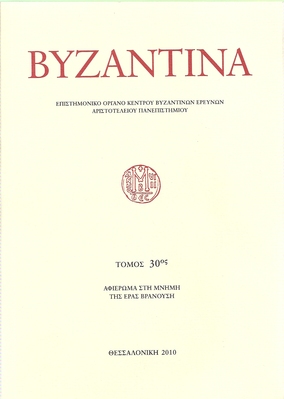Ο των Ελλήνων βασιλεύς Αλέξανδρος ο Μακεδών : μέσα από το έργο των Βυζαντινών χρονογράφων: έως τα τέλη του 10ου αι.
Part of : Βυζαντινά : επιστημονικόν όργανον Κέντρου Βυζαντινών Ερευνών Φιλοσοφικής Σχολής Αριστοτελείου Πανεπιστημίου ; Vol.28, No.1, 2008, pages 81-96
Issue:
Pages:
81-96
Parallel Title:
Alexander the Great through the work of Byzantine chronicle-writers : until the end of the 10th century
Author:
Abstract:
The purpose of this article is to examine the opinion the writers of the Byzantine chronicles (such as John Malalas 6th c., John Antiocheus 7th c., the anonymous of the Paschalion chronicle 7th c., George Syncellus 9th c., George the Monk 9th c. etc.) had about Alexander the Great and his origin. Also their ideas about his activity and work are investigated -how Alexander namely, started his campaign against Dareius and the Persians after the death of his father Philippe, the regions he conquered, how he reached Palestine and the way the Jews reacted, the reforms he made when he abolished the Persian empire, his reaching India submitting Poros, the incident with the queen Kandake, and his death in Babylon. Through the Byzantine chronicles our aim, therefore, is to sketch the personality and activity of this great King.The Byzantine chronicle-writers face Alexander and his achievements with admiration. Nevertheless, the information they provide is not in detail and at some points is historically inaccurate. On the other hand, in a lot of cases they are reliable, which indicates that they had knowledge of the historic past.The Byzantine chronicle-writers know the historical sources and also use facts and evidence from the various versions of the novel of Pseudo- Kallisthenes, such as the case of Alexander’s birth from pharaoh Nectanavo or the incident with the queen Kandake. In other cases they draw information from the Old Testament, as in the interpretation of prophet Daniel’s vision about the fight of the ram (king of Persians) with the billy-goat (king of Greeks) or they take into account the Jewish traditions, for example Alexander’s arrival to Jerusalem and his worship to the temple of God.Generally, the legendary element is emphasized. Alexander is presented as a hero, who is connected with Achilles, since his mother Olympias was descended from the Kingdom of Molossoi of Epirus, in which, according to the tradition, the ancestor was Achilles. Additionally, Alexander is presented as a God, son of Ammon, since he was born, according to a version, from the pharaoh Nectanavo of Egypt, who was identified with God Ammon-Sun. Finally, Byzantine chronicle-writers consider Alexander as a familiar and not a stranger, who fights for Byzantines and liberates territories which were lost. The references of the Byzantine chronicle-writers and other intellectuals about Alexander and his father Philippe have been continued during the following (after the 10th) centuries and especially during the Late Byzantine period. In these crucial times for the Byzantine empire, kings, princes and scholars refer to Alexander in order to take courage and strength to confront the various enemies of the empire.
Subject (LC):
Notes:
Γεώργιος Μοναχός, Χρονικόν σύντομον, έκδ. C. de Boor, corr. P. Wirth, Georgii monachi Chronicon, τ. 1-2, Stuttgart 1978, a. 408. 4-8: είσεσθε δε σαφέστερον ακούσαντες αυτής της οράσεως, ην διά παραβολής ημίν ο προφήτης (Δανιήλ) ανήγγειλεν, κριόν μεν καλών τον των Περσών βασιλέα Δαρείον, τράγον δε τον των Ελλήνων βασιλέα Αλέξανδρον τον Μακεδόνα. Όσον αφορά την ερμηνεία της οράσεως του προφήτη Δανιήλ σχετικά με τον Μ. Αλέξανδρο και τον Δαρείο, θα αναφερθούμε αναλυτικά στη συνέχεια αυτής της εργασίας. Ας σημειωθεί επίσης ότι το παρόν άρθρο αποτέλεσε ανακοίνωση που εκφωνήθηκε στη Ζ' Συνάντηση Βυζαντινολόγων Ελλάδος και Κύπρου, η οποία πραγματοποιήθηκε στην Κομοτηνή (20-23 Σεπτεμβρίου 2007). Θα ήθελα επιπλέον και από τη θέση αυτή να εκφράσω τις ευχαριστίες μου προς το Κέντρο Βυζαντινών Ερευνών της Θεσσαλονίκης για τη συνδρομή και βοήθεια που μου προσέφερε κατά την ανεύρεση και συγκέντρωση της βιβλιογραφίας της εν λόγω μελέτης., Το άρθρο περιέχεται στο αφιέρωμα στη μνήμη του Γεωργίου Λάββα




